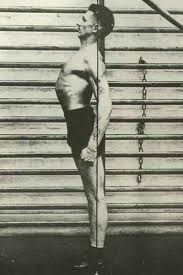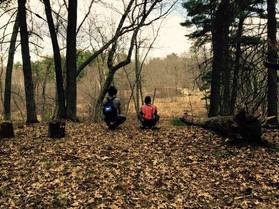|
6/28/2016 1 Comment Silence Actually Is GoldenA moment of silence. Wherever you are, stop. Turn off the television, turn off your music. Just sit in silence.
After a break, how does your brain feel? How do your thoughts feel? Does your whole system maybe feel a little less excited? Perhaps there is a little more room for change? I was inspired by a (relatively) recent Huffington Post Article on the potential benefits of silence for the brain to examine the level of silence present in my own life. With the flurry of world events, the bustle of spring/summer, and living in a major city in full swing, I was finding my life and my work cluttered, and wasn't getting the same benefit from my self care (especially active rest) as I was used to. Upon examination, I realized I had developed some habits that were designed to increase the presence of noise in my life--listening to music and podcasts, constant checks of social media, etc. I found that I actually resisted letting go of the noise, but the moment I made a commitment to creating space, I experienced a flood of relief and ease. The resistance to silence is part of my addiction to activity--something may of us experience. We like to feel that we are accomplishing, doing, engaged. However, being in a constant state of 'doing' keeps us from the many theorized benefits of 'non-doing' cataloged in the various studies mentioned in the article--information processing, formation of memory, restoration of our mental resources, and possibly even the growth of new brain cells. I am reminded of Tracy Lett's speech at Chicago Ideas Week in which he posits that one of the most important factors in living a creative life is allowing yourself to be bored--without that vacuum, there is no space to allow something new. All of this connects with the essential Alexandrian concept of Inhibition--allowing yourself not to react to the stimulus to 'do' something immediately so you can exercise choice in your actions. When this principle is applied in lessons, students often observe that their movement feels 'quieter', and that the world seems to come into sharper focus. I believe this sharper focus is because there is less noise to block us from perceiving the world around us fully. So I've made some changes. I have stopped listening to music during lie downs. I have tried to limit social media and email times to a couple checks a day. And I have tried to bring more silence to my work with students, so they can better hear the still small voice of ease inside themselves. I challenge you this summer to find some opportunities to let silence into your life and to reap the benefits.
1 Comment
6/17/2016 0 Comments The Use of the Self(ie). I had to get my drivers licence renewed this week. I showed up at the DMV with one and only one objective: to get a better photo than the last time. When they called me up to the camera, I was ready. I had checked my hair and teeth to make sure they were clear of blatant disruptions. Last time they took the photo without me realizing, resulting in a strange expression. This time, I was ready to smile through it. I got up there, look confidently into the lens..... And the photographer asked me to look at a dot two feet below my eye line. Being the Alexander nerd I am, I looked with my eyes and used a gentle release at my Atlas joint to look at the dot, crunching my neck as little as possible. The result--a photo where it looks like I have two extra chins. I was not happy. Why do I tell this vain story? Because the rest of the day, I found myself wanting to arch my neck and stretch my head forward to avoid creating that double chin. By the end of the day I had a stiff neck. How does our body image affect our movement? This is a complex question. There are a lot of factors that go into it, from body dismorphia (which I think could possibly have a connection to the Alexandrian concept of debauched kinaesthesia--we often have a distorted sense of our body's relative position and shape) to neurological connections to trauma and addiction. For the scope of this piece, I am going to limit the discussion to what I'm going to call 'selfie syndrome'. While this is popularly used to describe a certain type of Instagram-fueled narcissism, here I am using it to refer to how we try to compress our bodies to fit our illusory self image, especially while looking at ourselves or taking photos. There are 3 most common habits which I have seen with students: 1) Compressing the face (duckface) to make the cheeks look thinner and the lips bigger, adding tension to the jaw, and often unconsciously compressing the neck in the process. 2. What I was guilty of: stretching the neck and tilting the head back to reduce the appearance of extra fat underneath your chin. 3. Sucking in the stomach to make the stomach look smaller or flatter (reducing in frozen breathing, rigid lower back, and anxiety from the breath being pushed into a panic pattern). I also have students who do this on a postural level--when they look in the mirror, they try to 'straighten' their bodies into a shape they find looks attractive, which inevitably is unsustainable and full of tension, leading to eventual collapse and soreness. These are all very understandable--there is a tremendous pressure to 'look good' in our society, even if it comes at the cost of actually well being, and every self-judgement has consequence. With these, the compromise is Use--these habits can lead to back and neck pain, or potentially even panic attacks that could contribute to the reiteration of the cycle of self-judgement. In fact, I have had students who have trouble with the concept of trying to expand into length and width at all on the worry that bigger=bad. I don't know what the answer to this complex question is, but I propose that the first step is awareness--next time you look in the mirror, how do you feel you need to compress yourself to make yourself more acceptable? Maybe knowing this can give you an opportunity to use a little 'Inhibition'--putting some space between stimulus and response--to see whether the best looking you might be however you are at the moment. Many positive changes towards health can come from acceptance. Always easier said than done. For more discussion on body image issues, I recommend my partner Melody's blog Positively Melody, which focuses on her eating disorder recovery journey and her transition to a body-positive lifestyle. I welcome your thoughts on this complex issue. |
Thoughts on what is going on in the work and the world right now. Many posts to come. Archives
June 2021
Categories |

 RSS Feed
RSS Feed